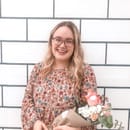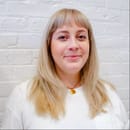Raise your hand if you’re trash at taking care of yourself. Cool, cool, cool, haha, cool, same. When the planet is dying, our political climate is in turmoil, and we’re not even halfway to holiday break, it can be easy to joke about losing sleep and drag yourself for crying all the time.
But on a serious note, college is an extremely stressful time. It leads many students to rely on variety of unhealthy habits to cope with academic and social demands. And yet, despite how crucial it is for students to take care of their mental and physical health, we’ve found that campuses aren’t taking wellness concerns seriously enough. In reality though, self-care is mainly a personal responsibility, and it can be as accessible and wide-ranging as relaxing with a skin-soothing face mask, or staying in on a Saturday night instead of going out for the third weekend in a row.
Now enter Anna Borges, an HC alum and the senior health editor for SELF, who recently spoke to us about her book The More or Less Definitive Guide to Self-Care, which features a plethora of ideas about how to take care of your well-being. She has been making serious moves as an outspoken health reporter (in case having a toolkit filled with 200 tips for you to practice self-care wasn’t enough of a hint), and her book is kind of what every college student needs right now.
Read on to learn more about some mental health and self-care rituals that might resonate with you, and get ready to soak up every but of Anna’s wellness wisdom.

Her Campus: You’ve been an outspoken health advocate and reporter for years, but what was the moment that made you want to write this book?
Anna Borges: I don’t think there was any single moment. Writing books has always been on my list of goals, and for most of my life, my book dreams were separate from my day job as a journalist. But an editor approached me when she saw the article that inspired the book, an A-Z guide to self-care on BuzzFeed. When she asked what I thought about turning it into a book, I was like, “Wait, that would be awesome.”
As someone who basically lives on the internet—and who has learned a lot about self-care online, too—there is something to be said for an offline resource like this book. A lot of my self-care involves disconnecting and taking time for myself, which can be directly at odds with sorting through an immense number of articles, tweets, Tumblr posts, and other online resources for self-care tips. Compiling it all in book form gets to the heart of what self-care is about for me: it shows what a sprawling, multidimensional thing it is without making it seem overwhelming.
HC: What was your most outstanding moment of realization about health and self-care while writing this book? Were there any significant insights?
AB: I didn’t need to do as much new research for this book as you might expect—it’s very much a culmination of six years of mental health reporting and writing. At first, I was overwhelmed at the thought of filling a whole book with self-care tips, but when I sat down to work on it, the entries just poured out of me. I guess you could say that the biggest moment of realization was just how much of this information had set up camp in my brain over the years. Every interview I’ve ever had with a psychologist, therapist, or counselor, every article I’ve written or edited, every personal therapy session I’ve ever had—it was all there.
The things I found most insightful and new actually came from people who wrote in to share their self-care routines with me. Experts are full of important information regarding what healthy, effective self-care look like, but there’s something about getting a look into what self-care actually looks like in practice that’s so fascinating and intimate. Through them, I got confirmation for the theory I had when I set out to write this book: that self-care is so deeply personal, will look different for everyone, and not even the most exhaustive of guides will cover it all.
HC: During college, it’s easy to oscillate between being obsessed with my personal wellness, or being completely garbage about self-care. But knowing that self-care should be a priority, in your opinion, what are some of the best ways college students can maximize that during years when academics are supposed to be the main priority?
AB: Resist the urge to internalize the message of what is “normal” in college. A lot of really unhealthy behavior is normalized or even romanticized in college—pulling all nighters and being constantly stressed, binge-drinking and partying to escape your emotions, feeling anxious or tired or depressed or overwhelmed. And if you brush all that off as just being “part of the college experience,” you’re less likely to get help for it. That’s what it was like for me. I knew I was suffering in some way, but I was like, “This is how everyone feels in college. I’m not ‘bad enough’ to need help.”
On that note, please take advantage of your campus resource center! Most college campuses offer at least a few free sessions to dip your toe in, and that is just not a thing that happens in real life once you graduate.
HC: The majority of our Her Campus community members hope to work in the media industry someday. As someone involved in it yourself, do you have any tips for self-care in this particular field?
AB: YES. My biggest piece of advice is to have something you love that has absolutely nothing to do with this industry. The media world has a sneaky way of making you feel like everything you do has to contribute to your work and to be honest, that’s a one-way ticket to burnout. And more than ever, writers and editors are being asked to cultivate personal brands and become influencers in their own right. And when that happens, the line between work and life becomes very blurry, and suddenly, you’re always working.
I’m guilty of this myself. Whenever I do something, at the back of my head, I can’t help but wonder, “Hm, can this be turned into content?” Most experiences I have, I’m always wondering whether or not it’s worth posting on social media. Whenever I write, even for fun, I put added pressure on myself to shape it into something I can sell: is this a book, a short story, an article?
We’re pretty much socialized to think this way—it’s the forces of capitalism and burnout culture at work. So to keep myself from losing my mind, I need self-care activities that aren’t just me sneakily trying to be productive or monetize my joy. For me personally, that looks like goofing around with my friends or playing video games or making a really fabulous cheese plate. And not posting it on Twitter or Instagram.
HC: Where would you recommend young people start if they’re entirely new to self-care?
AB: I do really hope that my book can serve as a good beginner’s guide because there is so much out there that it can be really overwhelming. Where to start with self-care depends so much on you and your personal needs that I think that an exhaustive guide gives readers the biggest chance to stumble on something they’ll actually use. Plus, if I were to create a self-care reading list, we’d be here all day—there’s so much good stuff out there, from deeply touching personal essays to hilarious accounts of people trying to navigate the many ways self-care has been co-opted by consumerist culture.
That said, there’s nothing I recommend more than therapy as a starting point for figuring out what self-care looks like to you. I say this with a huge asterisk about how the ability to access therapy is a huge privilege not everyone has, so this is much easier said than done. But if you have the means to see a therapist, a good one will guide you through the whole process of learning how to practice self-care outside of therapy, too.
HC: In addition to discussing the ways self-care can manifest from A-Z, this book is also filled with art, charts, and illustrated how-tos. How does the illustration round out the overall message of your book?
AB: The look and feel of the book was really important to me from the beginning. In fact, because I know that writers don’t always get much of a voice in the design process of a book, that was one of the first things I brought up while we were still in negotiations about Self-Care. I was like, “I want reading this book to be an act of self-care itself.” I wanted it to be soothing and pretty to read and to hold, and they knocked it out of the park.
And of course, the flowchart at the back is a callback to my BuzzFeed roots. I wanted to help people skip the line and find exactly what they need when they need it. This isn’t a book I expect people to always read cover-to-cover.
HC: You encourage readers to find their own definition of self-care — but what’s yours? What are some of the practices and routines that have worked best for you?
AB: I’m still discovering it every day, and it’s subject to change. Right now, my definition of self-care is trying my best to take care of myself and not beating myself up when I inevitably screw up. My self-care, in all its forms, is rooted in self-compassion.
As the school year progresses, self-care is an absolute essential. As mentioned above, so many unhealthy behaviors are normalized and romanticized during the college years. In your everyday life, though, go easy on yourself. Make self-care a priority with each day, no matter how you practice it. And if you don’t know where to start, we know just the book to help you along the way.



